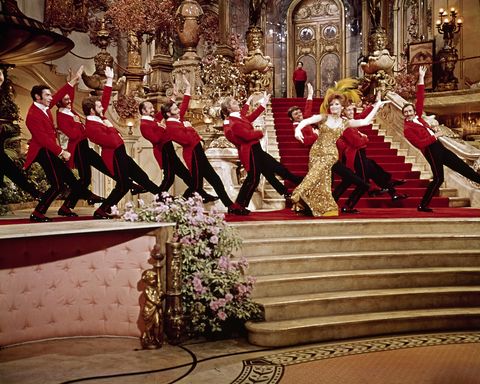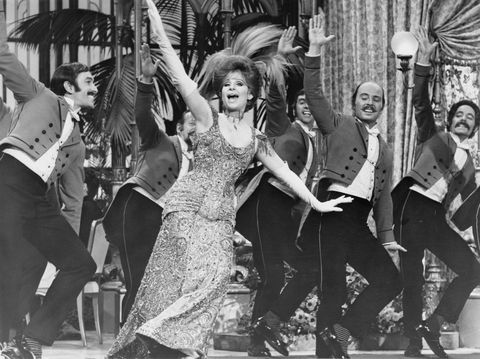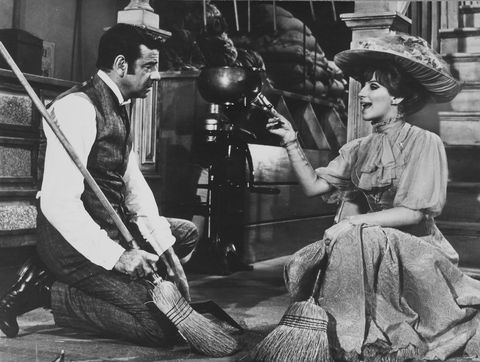Yes, Hello, Dolly! is ostensibly about a meddling matchmaker rearranging an interconnected web of couples to help everyone, herself included, find love. But the truth is the 1969 musical and the hit stage show on which it is based are solely driven by one woman’s single-minded pursuit of a stuffed chicken dinner at her favorite restaurant. This I understand, particularly recently as I sit at home and scroll through old Instagram posts from beloved local eateries, gently singing “World Take Me Back.” (It’s a song cut from the musical but then reinstated when Ethel Merman joined the Broadway show. My quarantine is thorough, completist, and esoteric!)
The widowed matchmaker Dolly Levi (Barbra Streisand) opens the film by revealing through a Freudian slip her desire to marry her grumpy client Horance Vandergelder (Walter Mathau) but it isn’t until midway through that the real story comes to light. While constructing a convoluted plan to help Horace’s niece, Horace, Horace’s erstwhile match Irene, and herself, Dolly utters the words “Harmonia Gardens restaurant” and, in terms of plot twists, the moment is the musical theater equivalent of Amy Dunne showing up in the middle of Gone Girl. Yeah, love is great but have you ever gotten a table for two on a weekend night?!
Dolly used to go to Harmonia Gardens with her late husband Ephraim; the staff knew and adored her; she aches to go back even as she’s realizing she’s ready to begin a new love relationship. Although Horace performs annoyance at Dolly throughout the film, there’s surprisingly little question about their ending being a happy one. Indeed, Dolly spends almost as much time talking to Ephraim’s ghost as she does talking to Horace. Why, then, does Hello, Dolly! work? Because the relationship we really care about is not between a woman and a man but rather between a woman and a local small business. To wit, the two-and-a-half-hour film spends nearly 40 minutes inside Harmonia Gardens, including a 7-minute dance number called “The Waiter’s Gallop” and the title song, which runs about 10 minutes. When you think about the way this movie and the musical are constructed, finally getting to Harmonia Gardens has the same emotional lift as that kissing-in-the-rain scene from The Notebook.
So intense is our desire for Dolly and Harmonia to be reunited that in the recent Broadway revival, when Bette Midler/Donna Murphy/Bernadette Peters appeared at the top of the Harmonia Garden stairs, the audience spontaneously rose to its feet and started applauding. And then as the song neared its climax and Dolly and the wait staff began to penguin-strut around the restaurant with their arms outstretched like airplanes, people would again leap to their feet in a frenzy. Watching that moment in the 1969 film in my own home, I screamed “holy shit!” out loud and ran around the room. Yes, it’s possible this is partly quarantine madness, but also it’s the power of Hello, Dolly!
No shade to every musical theater heroine who ever wanted to be part of a different world, who was waiting for life to begin, or who just needed a cow as white as milk, a cape as red as blood, et cetera, but Dolly Levi’s quest is the most relatable. The woman just wants to go back to her favorite restaurant, have some chicken and dumplings, and do a 10-minute dance with the wait staff. Whomst among us has not had the same desire? For Dolly, the Harmonia Gardens represents a place where she and her late husband enjoyed many happy nights; for those of us in the present, Harmonia may be a favorite lunchtime eatery, a regular corner bar, an anniversary treat, or simply our preferred purveyor of unlimited salad and breadsticks. The big difference between Dolly’s life and ours, of course, is that while she was away, Harmonia Gardens remained open for business. For thousands of restaurants around the country, stay-at-home restrictions and public-gathering bans have meant closing to congregation and in many cases, closing altogether. While Dolly only needs to get her matchmaking ducks in a row, to get back to our favorite haunts, we’ll need a massive societal effort.
Fortunately Dolly, like a turn-of-the-century Elizabeth Warren, seems to have a plan for that. Although she’s most famously a matchmaker, Dolly is adept at addressing all manner of logistical problems, including one that preys on the minds of every character in the musical: money, what to do with it, and what to do when you don’t have it. Hello, Dolly! is a musical full of people putting on airs, pretending to have more wealth than they do, or fretting about poverty. Yes, there’s 40 minutes that’s basically “Be Our Guest” from Beauty and the Beast,but the rest of it is sort of like “Ain’t Got No” from Hair. There’s a lot happening. Dolly, however, has a solution. Early in the film she tells Horace that Ephraim always said, “Money should circulate like rain water. It should be flowing down among the people, to little dress makers and cab men, and restaurants. Setting up a little business here, furnishing a good time there.” Yes, when she’s not waxing rhapsodic about the nightly special at Harmonia Gardens, she is singing the sweet, sweet lullaby of socialism. She’s like Harold Hill, but instead of a pyramid scheme, Dolly’s come to town to sell everyone on the value of a social safety net.
Horace isn’t initially sold as the musical’s sole solidly-moneyed person (he dubs himself a “half-a-millionaire” which, uh, is still quite a lot of money). But he knows something is missing. “I’ve worked hard and I’ve become rich, friendless, and mean,” he says. “In America, that’s about as far as you can go.” Though the film is set in 1890 and was made in 1969, his ethos wouldn’t be out of place in the present. The only difference is that these daysm Horace would probably self-fund a presidential campaign. By the end of the film, however, he tells Dolly that money is like manure: “It isn’t worth a damn if it’s not spread around.” Well damn; put on your Sunday clothes and seize the means of production.
For Dolly, a complete life includes another marriage, yes, and also eating at Harmonia Gardens, but most importantly the ability and the funds to help people. She marries Horace because she likes him and also because she knows how to responsibly spread his money around. In this light, it’s possible the film isn’t actually a love affair between a woman and a chicken dinner after all, but rather one between a socially-minded logistician and the staff of the restaurant she loves. No wonder we jump to our feet when we see them dancing together. This is the best of what we can be: a society that supports its members because it is our moral duty and the core of our humanity. I think of the many virtual tip jars that have sprung up in recent weeks, allowing people to tip service industry workers who are out of work. I think of the restaurants that have organized GoFundMe drives to support their staffs. I think of the myriad ways we aren’t allowing the people who create the spaces we love to fall through the cracks in times of crisis so that one day, soon, we can return to Harmonia Gardens again.


